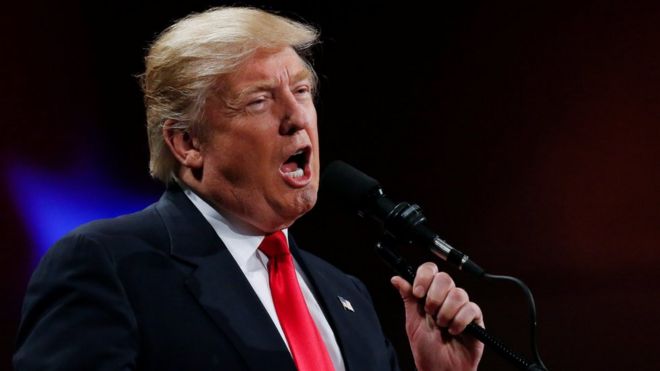
Donald Trump’s hand-picked policy advisers have indicated that some of his most controversial campaign promises may never be fully implemented.
The BBC spoke to members of the Strategic and Policy Forum, a group of 19 business leaders who will meet with the incoming president, who will be sworn in on Friday, on a regular basis to help shape his economic agenda.
They expressed scepticism over whether Mr Trump would be able to follow through on his pledges to rip up trade deals, repeal the Affordable Care Act or roll back energy regulations.
The Forum includes JP Morgan’s Jamie Dimon, Blackstone’s Stephen Schwarzman and General Motors’ Mary Barra – the latter of which has been at the receiving end of the president-elect’s Twitter attacks – and none of whom have been shy in making the case for globalisation and free trade.
One member of the Forum, BCG’s Rich Lesser, added to that chorus at the World Economic Forum in Davos.
\Speaking to the BBC, Mr Lesser said, “I believe the fundamentals of a strong globalisation framework are good for the economy,” and played down some of Mr Trump’s rhetoric on destroying decades-old trade relationships with Mexico and China.
“I think in many cases,” Mr Lesser said, “he’s not looking to blow things up, he’s looking to address what he and others perceive as real imbalances in trade.”
He also defended Nafta, the North American Free Trade Agreement which Mr Trump has referred to as “the worst trade deal in history”, as having been “a win” for all its constituent countries, including the United States.
And although he welcomed the chance to improve elements of Nafta and other trade relationships, Mr Lesser dismissed comments made to the BBC by the Trump administration’s Anthony Scaramucci, who had suggested that the US would win a trade confrontation with China.
“I don’t think anyone would win in a trade war,” Mr Lesser said.
Health check
Another member of the Strategic and Policy Forum, which has yet to meet with the president, said his oft-repeated campaign promise to repeal Obamacare, or the Affordable Care Act, would probably not be realised.
“It is a very complicated law, it is affecting the biggest industry in the United States, and it is well positioned,” said Dr Toby Cosgrove, who runs the Cleveland Clinic, a network of not-for-profit American hospitals.
“If you just repeal it, there’s going to be 20 million people who are without healthcare insurance and I think it would be politically very unpopular.”
Dr Cosgrove, who was decorated for his services as a surgeon in the Vietnam war, and who was initially tapped by Donald Trump to be the head of the Department of Veteran Affairs, also underlined the strength of US institutions and their restraining effect on policymaking.
“What you are going to see is the political reality of trying to get a bill through Congress,” he said of the president-elect’s efforts to repeal Obamacare.
“The US has a tripartite government. President-elect Trump is the executive, then we have the legislature and the judiciary. Each one is a modifying force on the other.
“I suspect what you are going to see is a continuing refinement of the law.”
Asked whether he thought Donald Trump understood the complex landscape of healthcare policy in the US, Dr Cosgrove said: “No, I don’t think he does.
“He has not been a policy person, he’s been a business person, but he has surrounded himself with lots of people who are familiar with the intricacies.”
Energy warning
Another member of the Forum also highlighted the limitations of the Oval Office and pointed to how Mr Trump’s plans could be frustrated by political forces in individual states.
Dr Daniel Yergin, a Pulitzer Prize-winning energy expert and vice-chairman of IHS Markit, said that while some regulations would be rolled back, the removal of clean energy subsidies and the ramping up of fossil fuel production would probably not “be as dramatic a change as possible”.
“Oil and gas production in the US is largely regulated by the states,” he said, “not by the federal government.
[Source:- BBC]
